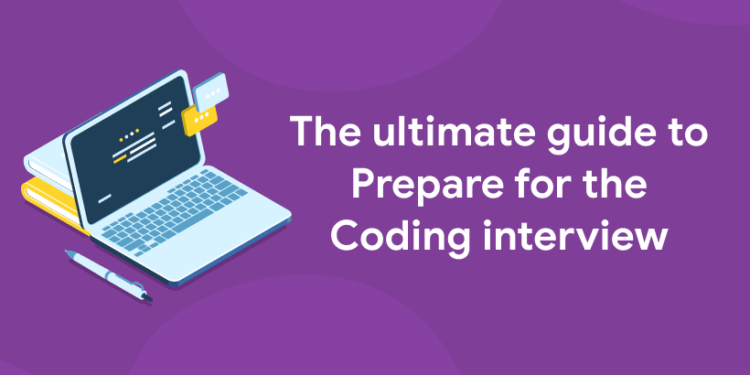Table of Contents
Interviews for software engineers may be scary. With the epidemic in place, finding a good job as a software engineer is difficult. The challenge begins with locating the appropriate resources and continues with selecting the coding platforms, determining the areas of attention, developing a timetable, keeping to it, and being focused and motivated along the journey. Everything becomes a little easier if you know what to anticipate and where to start. In this article, we will concentrate solely on the coding interview, which is the most difficult interview during recruitment. These interviews are primarily used to assess the candidate’s problem-solving abilities. If you’ve opted to take on the time-consuming process of preparing for your code interviews and don’t know how to make the most of your time, here is the only guide you’ll need to go from zero to hero on your coding exam.
What is a Coding Interview?
1: Which of the following data structures allows elements to be added and removed in a Last-In, First-Out (LIFO) order?
Coding interviews are a type of technical interview that is used to assess the abilities of a potential software engineer applicant by providing them with programming tasks. Coding interviews often focus on data structures and algorithms, although other technical rounds may include system architecture (especially for middle to senior-level candidates). A coding interview round usually lasts 30 to 45 minutes. The interviewer will ask you a technical topic (or questions), and you will be asked to address the problem in 30-45 minutes using a real-time collaborative editor such as CodePen or CoderPad (phone screen / virtual onsite) or a whiteboard (onsite).
Learn to code from industry experts! Enroll here!
How will you be evaluated during a Coding Interview?
The compiled assessment criteria from leading technology businesses and standardized them into a coding interview evaluation rubric that anyone may utilize. Although the language or weights may vary between organizations, leading IT firms always consider the following factors in their evaluation:
Communication entails asking clarifying questions and clearly communicating strategy and tradeoffs so that the interviewer can follow along.
Problem-solving entails understanding the problem and tackling it in a systematic, logical, and accurate manner, while also discussing numerous viable options and tradeoffs. Capability to properly identify and optimize time and space complexity.
Technical competence entails translating suggested solutions into workable code with little effort. Clean, accurate implementation with a solid understanding of language constructs. Testing – The ability to test code against regular and edge scenarios, as well as self-correcting code faults.
Learn Coding in your Language! Enroll Here!
Tips to Prepare for Coding Interviews
1. Pick a good programming language to use
A decent programming language for coding interviews is one that you are comfortable with and that is appropriate for interviews. What factors influence whether a programming language should be used for interviews? In general, we choose higher-level languages that include a large number of standard library functions and data structures and are thus “easier” to code in. Python, C++, Java, and JavaScript are recommended programming languages for coding interviews.
2. Plan your time and tackle topics and questions in order of importance
How much time should you spend preparing for a coding interview? It all comes down to how well prepared you want to be. It takes around 30 hours to cover the bare minimum and 100 hours to be adequately prepared. Always begin your coding interview preparation with a strategy. Calculate how much time you have until the coding exam to realistically prepare for your interview, and carefully plan out the subjects and questions you will cover each day, prioritizing the most critical ones first.
But how can you choose which subjects and questions to practice based on the time you have available? The algorithm underlying it comprises a priority rating of queries as well as a balance between the range and depth of topics addressed. If you have the luxury of time to prepare, it is advised that you devote around 3 months (2-3 hours each day) to more comprehensive preparation.
Learn to code from industry experts! Enroll here!
3. Combine studying and practicing for a single topic
It is advisable to study a particular subject and then immediately perform relevant practice problems for that topic to maximize memory retention and efficiency. Fortunately, there are already good coding interview preparation materials available to help you achieve this quickly and efficiently.
4. Accompany practice with coding interview cheatsheets to internalize the must-dos and must-remembers
To get the most out of your practice, I recommend using the coding interview cheat sheets listed below when learning and practicing: Cheatsheets for studying algorithms – contain the finest learning materials, must-remembers (tips, corner cases), and must-do practice problems for each data structure and algorithm.
5. Prepare a good self-introduction and final questions
At the start and conclusion of each software engineering interview, self-introductions and last questions to ask are nearly always necessary. As a result, you should always take the time to write a good self-introduction and set of closing questions. When done effectively, they can make a positive impression on the interviewer, which can tip the scales in your favor.
Learn to code from industry experts! Enroll here!
6. Try out mock coding interviews
Coding in front of an interviewer may be a nerve-racking experience, especially if you’ve never done it before, which is why obtaining hands-on experience is critical. Currently, the finest mock technical interview resource on the market is interviewing.io. It allows you to arrange anonymous mock coding interviews with genuine Google and Facebook experts. You might also schedule interviews for particular positions such as mobile, front end, and engineering management. Even better, if you want to ease into a real-world coding interview, you may watch recorded interviews and observe what phone interviews are like.
7. Internalize key tech interview question patterns
Many coding interview answers contain a similar set of essential patterns – and mastering them can help you tackle any long-tail problem that is not covered by the collection of often asked coding interview questions.
Things to keep in mind
It is not sufficient to solve an issue. Even if you’ve solved the problem, check out the other solutions in the solutions area. This trains your brain to try out new ways and helps you grasp diverse points of view. Examine how individuals code as well. You could discover a great trick or function that you can use in your day-to-day coding.
Learn to code from industry experts! Enroll here!
Communication
It is critical that you communicate well with the interviewer. Even if you’re pondering, attempt to keep the interviewer interested by speaking out loud and clearly. When explaining your approach you can cover points such as why you chose a particular data structure, the actual logic, the complexity advantage over an alternate approach, etc. Interviewers are frequently more concerned with the approach than with the outcome.
Mocks are important
Mock interviews can help you improve your communication skills, performance under pressure, ability to identify the direction your interviewer is pointing you in, decision making, time management, and other skills. I cannot emphasize how important mock interviews are.
Maintain consistency.
Before you begin, establish a goal. Make it clear what you want to accomplish. If your objectives are lofty, so should your preparation. Make an effort to be consistent and regular. It takes time for everything. Some of you might struggle with every question at first, but that’s fine. Keep going. You’ll eventually get better with practice.
Conclusion
With all of this in place, I hope you know where to start and what to expect from your preparation. But keep in mind that everything above is only applicable to the coding interview. To succeed in interviews, you must also prepare for System Design, Object Oriented Design, and behavioral interviews. Not to mention the fundamentals: operating systems, database management systems, and so on. If you are interested to learn new coding skills, the Entri app will help you to acquire them very easily. Entri app is following a structural study plan so that the students can learn very easily. If you don’t have a coding background, it won’t be any problem. You can download the Entri app from the google play store and enroll in your favorite course.
Learn to code from industry experts! Enroll here!











